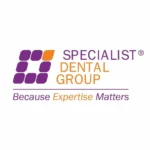Article reviewed by:
Dr Tan Kian Meng • Prosthodontist
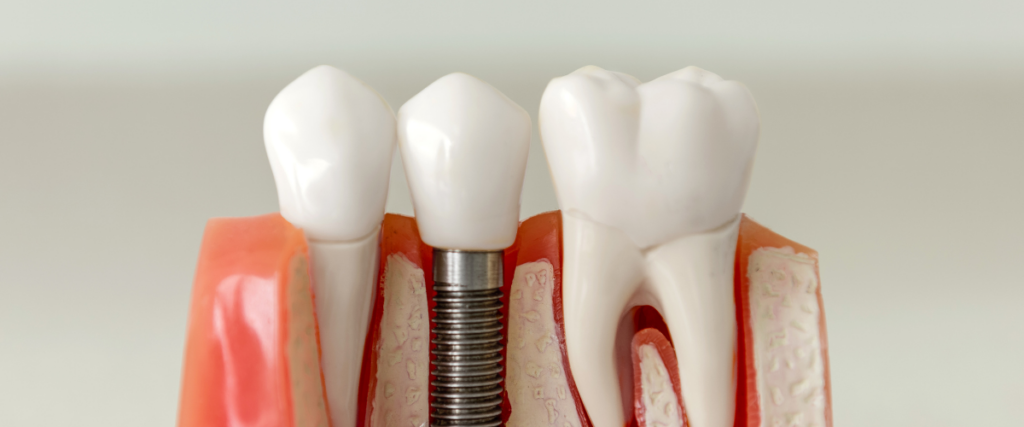
Healthy teeth play a significant role in our lives. Aside from helping us to chew and digest food, it is undeniable that a beautiful smile increases a person’s attractiveness. Similarly, the absence of a tooth can lead to functional issues and profound emotional impacts such as diminished confidence. Research has also shown that dental implants enhance a person’s self-esteem.
In this blog, we cover some commonly asked questions on dental implants.
- What causes tooth loss and pain?
- What are the effects of missing teeth?
- What are the different teeth replacement options available?
- What are the surgical processes and time needed for dental replacements?
- Will you experience any discomfort during dental implant treatments?
- What are the materials and technology used for dental implants?
- What are the differences between dental restoration treatments?
- Can dental implants work for older people? What about youths?
- What to expect if you have a pre-existing condition?
- How do I select the right specialists?
What causes tooth loss and pain?
Are you aware that human possesses a biting force of as much as 120 kg for our first molars? However, negligence in oral health results in advanced gum disease or loose teeth in the long run. Accidents and hereditary factors are also possible contributing factors to tooth loss. Let’s look at some of the causes.
Advanced gum disease
Your gums function as protective shields for your tooth roots that keep your teeth stable and stimulate your jaw bone to grow around the tooth. If bacteria inflame your gums, these ligaments start vanishing. Your gums may shrink, resulting in bone loss surrounding your tooth.
Also known as periodontal disease, gum disease loosens your teeth and exposes sensitive tooth roots. Consequently, bacteria can quickly form on your teeth, leading to tooth-root decay and loss.
Accidents
If you are an active sportsperson, unfortunate accidents could lead to losing one or several teeth and cause gum and jaw bone trauma. Generally, trauma only becomes apparent months or even years after the accident, with an already impacted tooth root.
Hereditary factors
Known as congenital oligodontia or anodontia, individuals born with this disease have fewer or no teeth. Some may never develop their permanent adult teeth. If the tooth enamel (surface) is not strong enough, it may lead to a cone or peg-shaped teeth (e.g. in ectodermal dysplasia cases).
Dead tooth
Dental plaque is a biofilm that forms on your teeth and gives you a rough sensation. If not regularly brushed away, bacteria may be attracted to the plaque, which transforms the sugar and starch in your mouth into acids. These acids harm the tooth enamel by dissolving the minerals that harden it.
With time, cavities will start to plague your teeth. If not treated promptly, the decay may spread deep into the gum tissues, and your tooth may die.
What are the effects of missing teeth?
Your teeth play a significant role in your everyday existence, facilitating food consumption and digestion and contributing to the structure of your facial features. The absence of any tooth can significantly influence your overall well-being, with potential repercussions for your dental and oral health in the long run.
Impairment of speech
Losing your teeth, especially in a consecutive row, can impact your capacity to articulate speech clearly and audibly, possibly hindering your communication with others.
Inability to chew
Missing teeth (especially back teeth) can also hurt your chewing ability. You may no longer be able to enjoy foods like steaks, nuts, and other dishes.
Headaches and migraines
The remaining teeth might tilt themselves toward the gap of a missing tooth due to bone loss. That will affect how your upper and lower teeth meet, impacting surrounding muscles and joints and leading to pain and other symptoms, such as headaches or migraines.
Loss of bone
Chewing with a healthy tooth contributes to the strength and quality of your jaw bone, much like how physical activity protects against bone loss in your limbs. However, if you lose your teeth, your jawbone will no longer be stimulated by your teeth and tooth roots, gradually decreasing bone density.
Look more aged

Besides creating a gap in your smile, tooth loss can lead to a lack of internal support for your lips. Your chin can shift forward and upward, while your lips may curl inward. In addition, your cheeks may lose volume and appear more sunken, contributing to a more aged appearance.
What are the different teeth replacement options available?
Various teeth replacement options are available depending on the extent of your tooth loss. Some of these options, such as dental implants, are permanent. Others, such as dentures, are temporary. Each option has its advantages and disadvantages.
Dental implant
A dental implant is an artificial tooth root made of titanium that replaces your missing tooth. It fuses with the jaw bone (osseointegration) to form a stable foundation for the implant crown, the visible portion of your new tooth. Dental implants are typically around 10 mm long and only 3-5 mm wide at the top.
When you have a single missing tooth, replacement via dental implant surgery is often the ideal choice. Your dental specialist will match the contour and shade of your implant crown to your natural teeth, so there is no apparent difference. An implant-based solution to replace a single tooth does not compromise healthy adjacent teeth or risk weakening neighbouring teeth due to continuing bone loss.
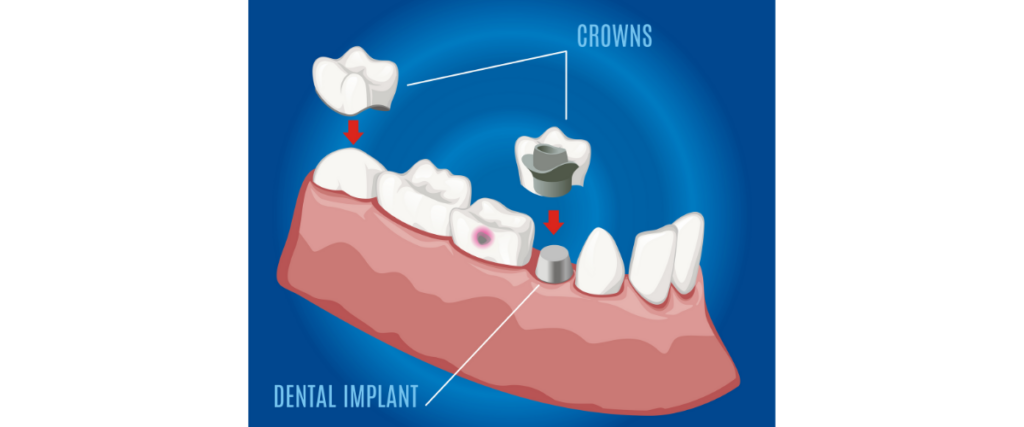
Dentures
Dentures are dental appliances that serve as a replacement for lost teeth and surrounding tissues. They are made from polymer resin materials. These removable appliances help to enhance both the appearance and the function of your smile. There are two categories of dentures: complete and partial. Complete dentures are recommended when an entire set of teeth needs to be replaced, while partial dentures are more widely used when a portion of natural teeth remains.
Related:
Can I sleep with my dentures on?
If the tooth does not play a vital role in speech or eating, some people may opt for removable partial denture (RPD) because it is lower in fees than a dental implant. The RPD needs to be attached to your existing tooth structure.
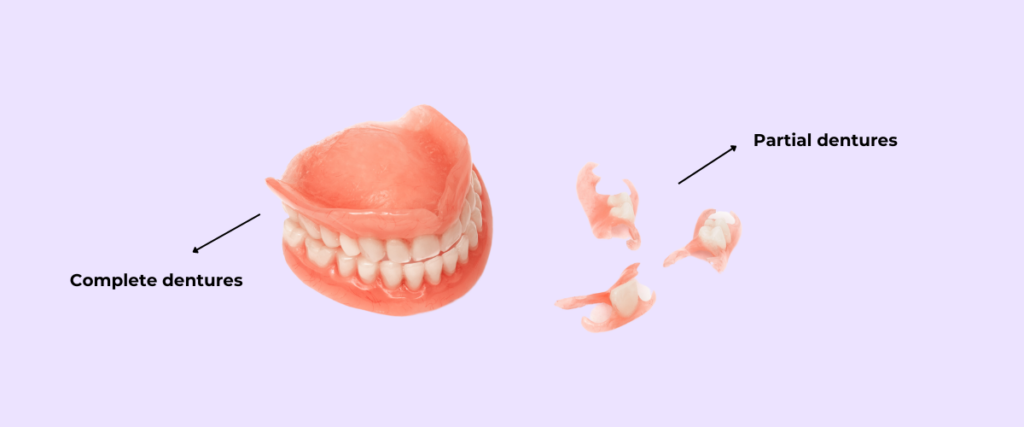
Multiple missing teeth
What if you have lost several teeth? Treatment solutions include bridges, bridges on implants, or dentures. These are the differences between the options:
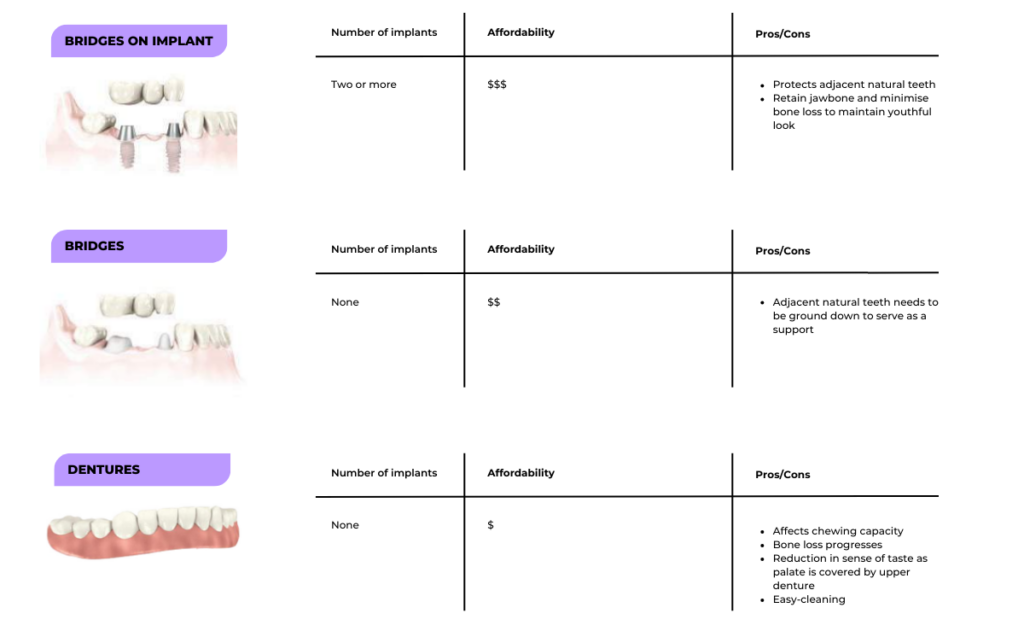
Multiple teeth on entire jaw (fully edentulous)
Alternative options exist if you have lost all teeth on an entire jaw. Depending on your needs, we have treatments offering different levels of stability, namely dentures, removable implant overdenture, removal overdenture on an implant bar, and fixed implant supported bridges (e.g. All-on-4, Trefoil)
Speak to a dental specialist to find out which missing teeth replacement solution is most suitable for you.
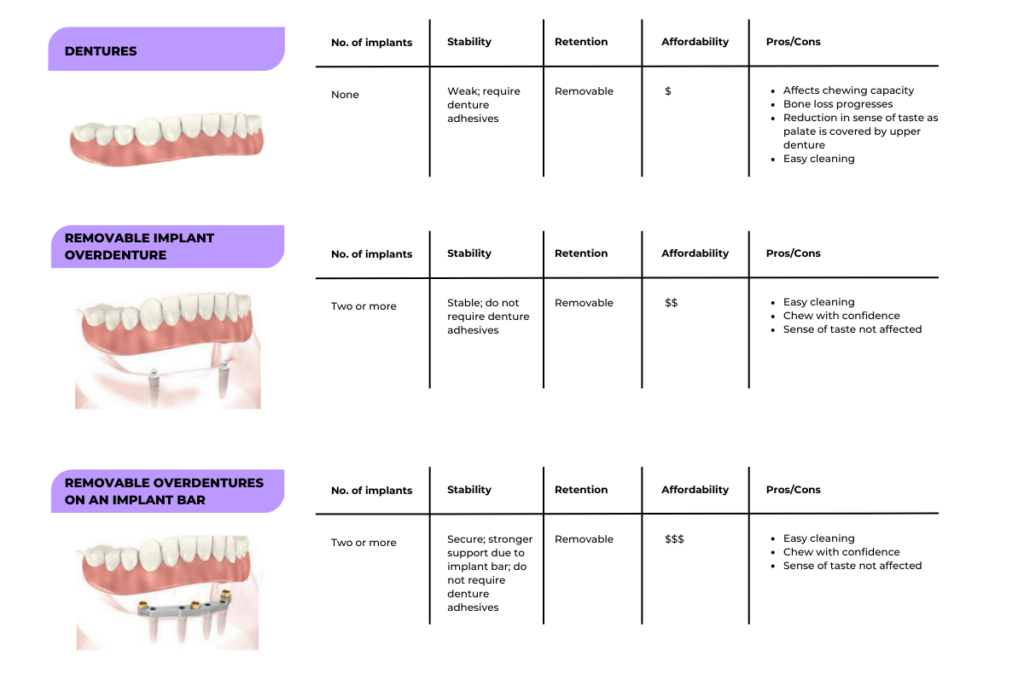
Below are permanent solutions anchored by sturdy, permanent titanium fixtures for support. These options provide superior outcomes post-treatment and help patients restore their eating ability while maintaining their looks.
Specialist Dental Group is the first dental clinic in Southeast Asia to offer the Trefoil solution to patients.
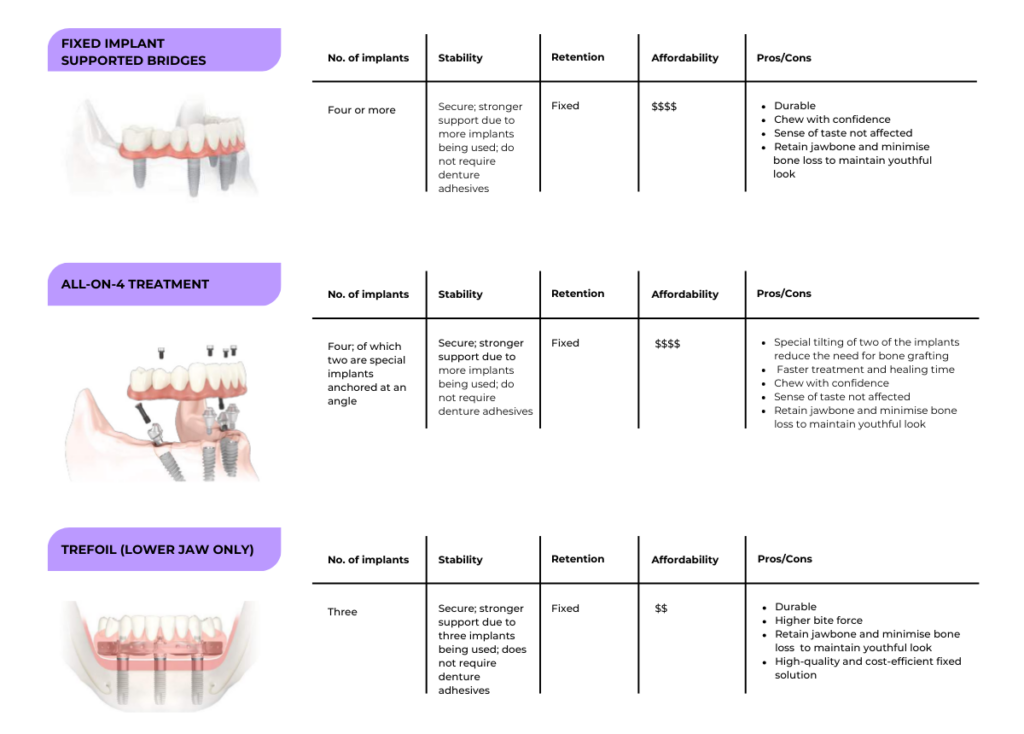
What are the surgical processes and time needed for dental replacements?
Contrary to popular belief, tooth replacement treatments like dental implants can be completed very quickly. Often, only one surgery is needed. We outline the required steps when an immediate placement method is applied:
Day 1
- Extraction of teeth (if necessary).
- Dental implants are placed (first and only surgery).
- Fix temporary tooth.
After three months of healing
- New impression-taking.
After two weeks
- A final replacement tooth is seated and treatment is complete.
At Specialist Dental Group, we have the expertise to place dental implants in one session. However, your treatment plan is dependent on your dental condition. The duration of the treatment can vary depending on the procedure, typically one to two hours. Afterward, the implant often needs about three months to integrate to fuse with the bone.
The better the quality of your bone, the better the conditions for the implant to fuse with your bone, and the shorter your treatment duration.
Depending on your dental condition, your dental specialist may prepare a temporary tooth to maintain your smile during the integration period. Once this integration phase successfully concludes, your final replacement tooth can be attached.
The video below shows the differences between immediate placement and conventional dental implant methods.
Will you experience any discomfort during dental implant treatments?
Most professional dental practices use local anaesthesia during implant placement surgeries to minimise any discomfort experienced by the patient.
You can opt for intravenous sedation if you or your loved ones are more nervous or have a few implants placed in the same surgery.
Specialist Dental Group’s oral surgery team works closely with anaesthetists to provide an anxiety-free experience for patients who may be apprehensive about the procedure or want to sleep through the whole process. You will have a new set of teeth by the time you are awake!
What are the materials and technology used for dental implants?
Titanium has been used for many decades and is the most suitable implant material. Research has shown that titanium implants are biocompatible with your body’s tissues. They are also not known to trigger any allergic reactions. Most professional dental specialists would recommend a combination of dental implants made of titanium and crowns made of zirconium.
Dental implants are solutions made to last as long as you do. Treated with proper care while practicing good oral hygiene, your implant can last your entire lifetime.
Do note that excessive alcohol consumption, smoking, diabetes, or other clinical conditions may disrupt an implant’s integration process and long-term success. Individuals who grind their teeth at night should also undergo a thorough evaluation with their dentist.
What are the differences between dental restoration treatments?
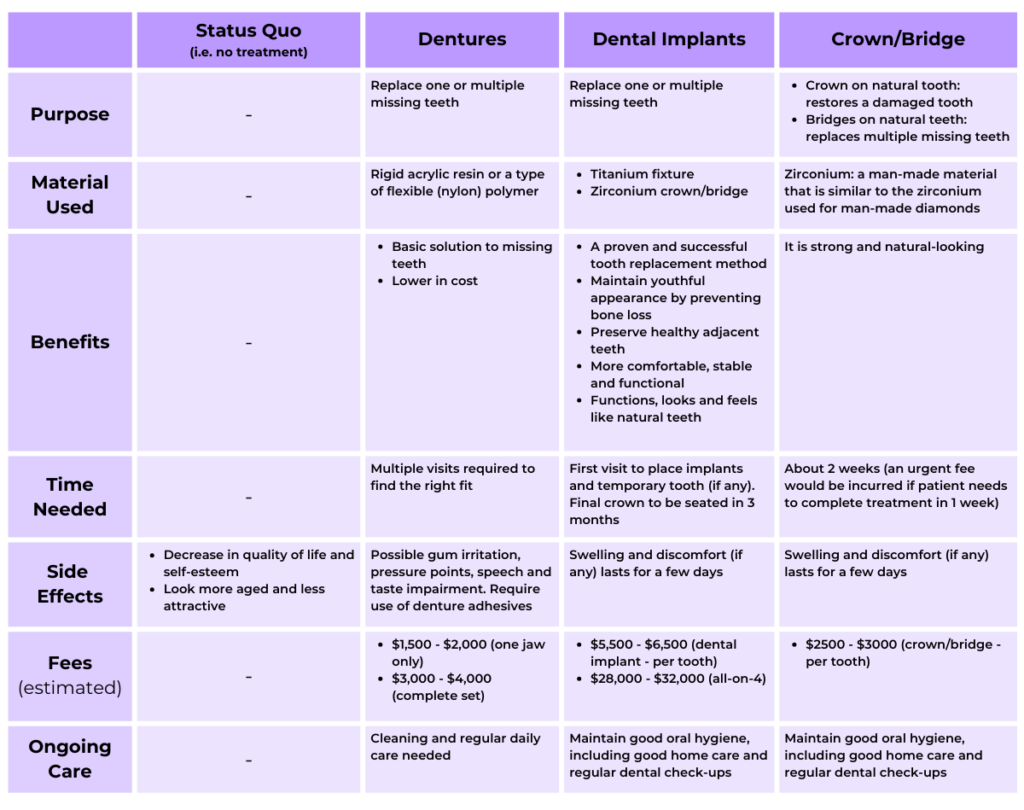
It should not hurt. Once you have completed the treatment, you will be able to resume your usual activities. There are, however, possible side effects to it. They include temporary sensitivity to the teeth or gum for up to 48 hours after the treatment. Manage the sensitivity by brushing your teeth with toothpaste designed for sensitive teeth and avoiding hot and cold drinks. Drinking through a straw will also help reduce hypersensitivity after the procedure.
Can dental implants work for older people? What about youths?
Typically, implants are not suitable for children whose jawbones have not fully developed.
Also, having good health is a primary deciding factor. Patients not suited for dental implants may have uncontrolled diabetes, cancer, uncontrolled periodontal (gum) diseases, have undergone radiation to the jaws, or be heavy smokers and drinkers.
Hence, it would help if you inform your dentist or dental specialist about your medical status (past and present) and all the medications you are consuming, whether prescribed, alternative (herbal), or over-the-counter.
For healthy older patients, your prospects of success are virtually the same as those of younger adults. There is no maximum age for placement of dental implants – indeed, one of our most senior patients was almost a century old!
What to expect if you have a pre-existing condition?
Advanced gum disease
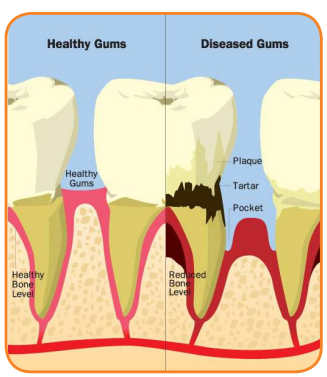
To be eligible for dental implant surgery, your dental specialist will check that you are free from untreated tooth decay or active gum disease. The long-term success of implants depends on good plaque control.
When there is active periodontitis, implants placed will risk infection developing around the implant, resulting in its failure and eventual loss.
After your treatment is complete, you need to attend regular follow-up appointments with your dental specialists so that they can assess the implants and take steps to avoid any early-stage complications.
Chipped tooth
Depending on your condition, there are various treatment methods available, such as fillings, composite bonding, crowns, veneers, or root canal treatment.
We advise you to seek professional help from a dental specialist or dentist for treatment.
Grinding teeth
It is crucial to find the underlying reason for teeth grinding (also known as bruxism) – it may be due to stress and anxiety, an abnormal bite, or a sleep disorder (e.g. sleep apnea). One of the most obvious dangers of teeth grinding is teeth damage.
Bruxism may cause other problems, such as headaches, sore facial muscles, or tender jaw joints. Hence, do seek professional help from a dental specialist. Treatment options include a customised mouthguard.
Patients with uncontrolled bruxism are usually not good candidates for dental implants as they may grind the implant too far into their gum line and damage their jaw. Your dental specialist or dentist must examine your dental condition to advise you.
How do I select the right specialists?
To ensure that you have peace of mind when replacing your missing teeth or undergoing other dental or gum treatments, you need to consult doctors with a breadth of experience across multiple disciplines. This is where the expertise of Specialist Dental Group lies.
Over 200 years of collective experience
Our team of internationally qualified dental specialists or dentists covers 5 specialty areas of dentistry and has a collective experience of more than 200 years.
Multi-specialties dental consultation
Hailing from different dental and oral health specialty areas, our Singapore-based dental specialists and dentists work hand-in-hand. This ensures that you can seek consultation from more than one type of dental specialist or dentist at the same appointment and enjoy a comprehensive approach to your dental needs.
Medically compromised patients
As one of Singapore’s few hospital-based dental practices, our dental team is well-versed with medically compromised patients and works closely with other medical specialists to manage your treatment needs. Our close cooperation with the Mount Elizabeth Hospital and the Gleneagles Hospital offers you access to world-class medical care, facilities, and interpretation and medical concierge services.
Dental thought leaders and experts
Our doctors are key opinion leaders within their respective specialty areas. They actively share their expertise with fellow dental colleagues in Singapore and the region.
Need a professional opinion? Schedule a consult with our dental specialist team to determine if a dental implant is suitable and which approach is most suitable for you.
